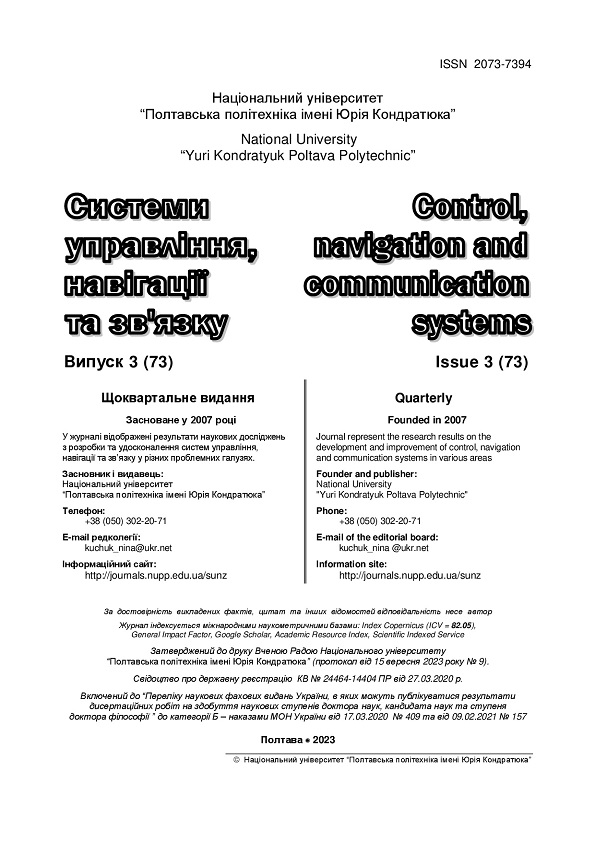PREDICTION OF FAILURES OF SHIP NAVIGATION SYSTEMS USING MACHINE LEARNING METHODS
DOI:
https://doi.org/10.26906/SUNZ.2023.3.037Keywords:
vessel navigation system, random forest algorithm, failure prediction, maritime safety, machine learning, accuracy, efficiencyAbstract
The purpose of this article is to develop a method for using random forest to predict failures of ship navigation systems with a high degree of accuracy to improve safety at sea. Ship navigation systems play an important role in maritime safety. They provide ship captains with information about their location, weather, and other conditions that may affect the safety of the vessel. However, the navigation systems of ships are also prone to failures. Errors in navigation systems can lead to collisions, flooding and other dangerous situations. The article proposes to use the random forest algorithm to predict failures of ship navigation systems. A random forest algorithm is a machine learning technique that can be used to build models that can predict the probability of an event. In this case, the event is the failure of the navigation system. The random forest algorithm works by constructing a series of decision trees. Each decision tree is built on a subsample of data. Subsampling of data is done randomly. The algorithm then combines the predictions of all decision trees to produce the final prediction. The article demonstrated that the random forest algorithm can be used to predict failures of ship navigation systems with a high degree of accuracy. A dataset of 1000 records was used. The dataset contained data from the sensors, as well as a label that indicated whether the navigation system was healthy at that point in time. The model was trained on 80% of the dataset, and 20% of the dataset was used to test the accuracy of the model. The accuracy of the model on the test set was 95%. Thus, the results show that the random forest algorithm can be used to improve safety at sea. It can be used to prevent failures of ships' navigation systems, which can prevent collisions, flooding and other dangerous situations.Downloads
References
1 Tsaganos, G., Nikitakos, N., Dalaklis, D. et al. Machine learning algorithms in shipping: improving engine fault detection and diagnosis via ensemble methods. WMU J Marit Affairs 19, 51–72 (2020). https://doi.org/10.1007/s13437-019-00192-w.
Xiao Lang, Da Wu, Wengang Mao Comparison of supervised machine learning methods to predict ship propulsion power at sea, Ocean Engineering, Volume 245, 2022, 110387, ISSN 0029-8018, https://doi.org/10.1016/j.oceaneng.2021.110387.
Christos Gkerekos, Iraklis Lazakis, Gerasimos Theotokatos, Machine learning models for predicting ship main engine Fuel Oil Consumption: A comparative study, Ocean Engineering, Volume 188, 2019, 106282, ISSN 0029-8018, https://doi.org/10.1016/j.oceaneng.2019.106282.
D. Li, J. Xu, H. He and M. Wu, "An Underwater Integrated Navigation Algorithm to Deal With DVL Malfunctions Based on Deep Learning," in IEEE Access, vol. 9, pp. 82010-82020, 2021, doi: 10.1109/ACCESS.2021.3083493.
Yiqing Yao, Xiang Xu, Xiaosu Xu, Itzik Klein, "Virtual Beam Aided SINS/DVL Tightly Coupled Integration Method with Partial DVL Measurements", IEEE Transactions on Vehicular Technology, vol.72, no.1, pp.418-427, 2023.
Kim, Y.-R.; Jung, M.; Park, J.-B. Development of a Fuel Consumption Prediction Model Based on Machine Learning Using Ship In-Service Data. J. Mar. Sci. Eng. 2021, 9, 137. https://doi.org/10.3390/jmse9020137.
Zhu, J.; Li, A.; Qin, F.; Che, H.; Wang, J. A Novel Hybrid Method Based on Deep Learning for an Integrated Navigation System during DVL Signal Failure. Electronics 2022, 11, 2980. https://doi.org/10.3390/electronics11192980.
Yuchao Wang, Hui Wang, Bin Zhou, Huixuan Fu, Multi-dimensional prediction method based on Bi-LSTMC for ship roll, Ocean Engineering, Volume 242, 2021, 110106, ISSN 0029-8018, https://doi.org/10.1016/j.oceaneng.2021.110106. (https://www.sciencedirect.com/science/article/pii/S002980182101430X).
9 Hastie, Trevor, Robert Tibshirani, and Jerome Friedman. The Elements of Statistical Learning: Data Mining, Inference, and Prediction. Springer-Verlag New York, 2009.
Bishop, Christopher M. Pattern Recognition and Machine Learning. Springer-Verlag New York, 2006.




